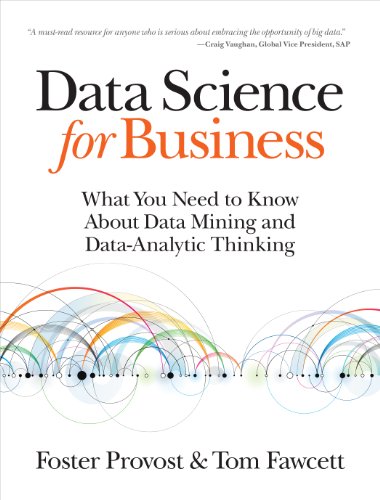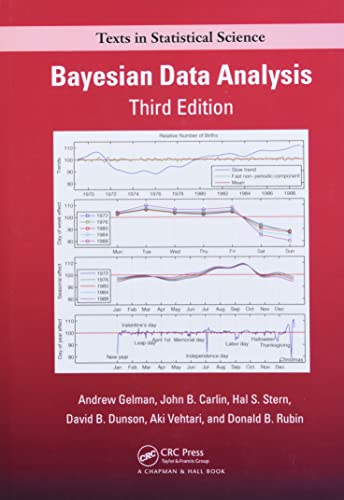12 Data Analysis Books That Separate Experts from Amateurs
Recommended by Kirk Borne, Carter Hill, and Laszlo Varro to elevate your Data Analysis expertise

What if the books you choose could dramatically sharpen your approach to data analysis? In a world awash with information, the ability to turn raw data into actionable insights is not just valuable — it’s essential. Data analysis shapes decisions in business, economics, science, and beyond, influencing outcomes that touch every part of our lives.
Among the voices shaping this field, Kirk Borne, Principal Data Scientist at Booz Allen Hamilton, champions resources like the Python Data Science Handbook for their practical depth. Carter Hill, professor at Louisiana State University, discovered Data Analysis for Business, Economics, and Policy as a pivotal tool for teaching and applying data techniques. And Laszlo Varro, Chief Economist at the International Energy Agency, highlights data analysis's role in addressing global challenges. Their endorsements reflect a shared belief: mastering data analysis requires trusted guidance.
While these expert-curated books provide proven frameworks, readers seeking content tailored to their specific background, experience, and goals might consider creating a personalized Data Analysis book that builds on these insights. This approach bridges expert knowledge with your unique learning journey, making complex topics accessible and relevant.
Recommended by Carter Hill
Professor, Louisiana State University
“This sophisticatedly simple book is ideal for undergraduate- or Master’s-level Data Analytics courses with a broad audience.” (from Amazon)
by Gábor Békés, Gábor Kézdi··You?
by Gábor Békés, Gábor Kézdi··You?
Drawing from their extensive academic and policy research backgrounds, Gábor Békés and Gábor Kézdi crafted this textbook to equip aspiring analysts with a practical toolkit for tackling complex questions in business, economics, and policy. You’ll learn how to navigate data wrangling, regression techniques, machine learning, and causal inference, all framed by real industry problems and detailed case studies. The book’s integration of Stata, R, and Python code alongside 360 practice questions ensures you not only grasp methods but also apply them effectively. This volume suits students and professionals aiming to bridge theoretical knowledge with hands-on data analysis skills relevant for decision-making contexts.
Recommended by Kirk Borne
Principal Data Scientist, PhD Astrophysicist
“✨🎉🌟Must see this >> Free #Python #DataScience Coding book series for #DataScientists ...via @DataScienceCtrl Go to ——————— #abdsc #BigData #MachineLearning #AI #DeepLearning #BeDataBrilliant #DataLiteracy” (from X)
by Jake VanderPlas··You?
by Jake VanderPlas··You?
When Jake VanderPlas, a software engineer at Google Research, wrote this handbook, he aimed to unify the essential Python tools scientists rely on for data work. You’ll learn how to manipulate arrays with NumPy, manage data frames using pandas, visualize through Matplotlib, and implement machine learning models with Scikit-Learn—all tied together in a single reference. Chapters detail practical applications, such as using IPython and Jupyter for interactive computing, making this book especially useful if you’re already comfortable with Python and want to deepen your data science toolkit. It’s best suited for researchers and data practitioners who want a cohesive guide rather than fragmented tutorials.
by TailoredRead AI·
This tailored book explores data analysis with a focus that matches your background and ambitions. It examines core principles and advanced techniques, guiding you through the process of extracting meaningful insights from complex datasets. By addressing your specific goals and interests, the book reveals how to navigate the vast landscape of data tools and methods in a way that resonates with your experience level and learning preferences. This personalized approach helps you deepen your understanding of data interpretation, visualization, and management, ensuring the content feels relevant and engaging throughout your learning journey.
Recommended by Kirk Borne
Principal Data Scientist at Booz Allen Hamilton
“Great book for Business Analytics and for building analytic thinking. Data Science for Business — What You Need to Know about Data Mining and Data-Analytic Thinking covers big data, machine learning, data strategy, and analytics strategy with clarity and depth.” (from X)
by Foster Provost, Tom Fawcett··You?
by Foster Provost, Tom Fawcett··You?
Foster Provost, a professor at NYU Stern, brings his extensive expertise in business analytics to this book, grounded in a decade of MBA teaching experience. The text dives into the essential principles of data science and the mindset needed to extract business value from complex data, emphasizing how to bridge communication between technical teams and business stakeholders. You’ll find detailed explanations of data-mining techniques paired with real-world business problems, like how to treat data as a strategic asset or how to approach problem-solving analytically in chapters that cover both theory and practical application. This book suits professionals looking to deepen their understanding of data’s role in decision-making and those involved in data science projects within organizations.
Recommended by Tim @Realscientists
Staff Scientist and science communicator
“If you are interested in learning programming, there are lots of great tutorials. For data analysis, R and the R 4 data science book is a great way to go and for general R syntax, there is the swirl learning package /20” (from X)
by Hadley Wickham, Mine Cetinkaya-Rundel, Garrett Grolemund··You?
by Hadley Wickham, Mine Cetinkaya-Rundel, Garrett Grolemund··You?
What began with Hadley Wickham's deep involvement in developing R packages evolved into a guide that demystifies data science with R for newcomers and practitioners alike. This book teaches you how to import, clean, transform, visualize, and model data using the tidyverse collection, making these processes accessible even without prior programming experience. You’ll gain hands-on skills in managing data from varied sources, crafting informative plots, and integrating code with narrative using Quarto, all structured around the data science workflow. If you're aiming to become proficient in R for practical data analysis rather than theory-heavy content, this book delivers a clear pathway.
Recommended by PsycCRITIQUES
“Writing for real people with real data. From the very first chapter, the engaging writing style will get readers excited about this topic” (from Amazon)
by John Kruschke··You?
by John Kruschke··You?
What started as a growing discomfort with traditional p-value methods led John Kruschke, a psychology and statistics professor, to develop this tutorial that demystifies Bayesian data analysis. You’ll find clear explanations paired with concrete examples and stepwise R, JAGS, and Stan code, guiding you from basics like Bayes’ rule to complex generalized linear models. Chapters on t tests, ANOVA, regression, and contingency tables offer practical insights, especially if you’re working in psychology, social sciences, or business analytics. This book suits graduate students or anyone seeking a solid foundation in Bayesian methods without sacrificing rigor or accessibility.
by TailoredRead AI·
This personalized book offers a focused 30-day journey to enhance your data analysis skills, tailored to match your background and specific goals. It explores essential concepts like data preparation, exploratory analysis, and visualization, while progressively introducing more advanced techniques such as statistical inference and predictive modeling. The content is curated to align with your interests, ensuring that each day builds your confidence and competence. By concentrating on your unique learning needs, this tailored guide reveals the practical steps to accelerate your abilities in transforming raw data into insightful conclusions. Engage with a custom pathway that makes mastering data analysis both achievable and engaging within a structured month-long plan.
by Andrew Gelman, John B. Carlin, Hal S. Stern, David B. Dunson, Aki Vehtari, Donald B. Rubin··You?
by Andrew Gelman, John B. Carlin, Hal S. Stern, David B. Dunson, Aki Vehtari, Donald B. Rubin··You?
Andrew Gelman and his co-authors bring decades of expertise in statistics to this detailed exploration of Bayesian methods. You’ll find a clear progression from foundational concepts to advanced techniques, including Hamiltonian Monte Carlo and variational Bayes, supported by real-world examples and updated software guidance. The book’s chapters on nonparametric modeling and convergence diagnostics provide practical tools for modern data analysis challenges. Whether you're a student beginning with Bayesian inference or a researcher refining computational strategies, this text offers a rigorous yet accessible path through the complexities of Bayesian statistics.
by Jonathan Rioux··You?
by Jonathan Rioux··You?
Unlike most data analysis books that focus narrowly on theory, Jonathan Rioux brings his real-world experience as a machine learning director to the forefront, teaching you how to harness PySpark for scalable data work. You’ll learn to manage data across clusters, tackle messy datasets, and build automated pipelines that integrate Python and Spark seamlessly. The book offers detailed chapters on key techniques like window functions and machine learning pipelines, making it especially useful if you want to bridge Python coding with big data processing. It's a solid fit if you’re comfortable with Python and ready to scale your projects beyond single-machine limits.
Recommended by Computer Cowboy
Open source contributor and data analyst
“This is awesome! Here is the Introduction to Statistical Learning book: And the Deep Learning lab (chapter 10) in Torch in R: The book (and accompanying exercises) is a *great* resource” (from X)
by Gareth James, Daniela Witten, Trevor Hastie, Robert Tibshirani··You?
by Gareth James, Daniela Witten, Trevor Hastie, Robert Tibshirani··You?
The authoritative expertise behind this book shines through in its clear, approachable presentation of statistical learning techniques essential for navigating complex data. Gareth James and his co-authors, all seasoned statisticians, designed it to bridge the gap between theory and application, using R to make topics like linear regression, support vector machines, and deep learning accessible without heavy math prerequisites. You'll find practical tutorials and real-world examples that turn abstract concepts into usable skills, especially in chapters on deep learning and survival analysis added in the second edition. This book suits anyone from scientists to marketers eager to apply modern data analysis methods with confidence.
by Andrew Gelman, Jennifer Hill··You?
by Andrew Gelman, Jennifer Hill··You?
Drawing from decades of expertise in statistics and political science, Andrew Gelman and Jennifer Hill offer a detailed exploration of regression and multilevel modeling tailored for applied researchers. You’ll find practical guidance on fitting both linear and nonlinear models, enriched by real-world examples and accompanying programming codes that clarify complex concepts. The book delves into causal inference techniques like regression discontinuity and instrumental variables, equipping you with tools to handle missing data and hierarchical structures. If your work involves sophisticated data structures and you want to deepen your analytical skill set, this manual provides a thorough, example-driven path without unnecessary jargon.
Recommended by Peter Westfall
Author, statistician, former American Statistician editor
“Peter H. Westfall has a Ph.D. in Statistics from the University of California at Davis, as well as many years of teaching, research, and consulting experience, in a variety of statistics-related disciplines. He has published over 100 papers on statistical theory, methods, and applications; and he has written several books, spanning academic, practitioner, and textbook genres. He is former editor of The American Statistician, and a Fellow of the American Statistical Association.” (from Amazon)
by Peter H. Westfall, Andrea L. Arias··You?
by Peter H. Westfall, Andrea L. Arias··You?
Peter H. Westfall's extensive background in statistics and decades of academic and consulting work shape this book's realistic approach to regression analysis. Instead of clinging to classical assumptions, it embraces the conditional distribution model and treats all models as approximations of nature's complexity. You’ll find clear explanations of key concepts like p-values, probabilistic modeling, and likelihood methods, supported by numerous R software examples and self-study questions. This book is especially useful if you want to understand diverse regression techniques beyond the traditional scope—covering everything from logistic regression to neural networks—making it a solid resource for scientists, statisticians, and advanced students alike.
Recommended by Kevin Gaskell
Serial entrepreneur, former MD Porsche GB, BMW GB
“One of the benefits of going digital is that organizations can collect, review and analyse enormous quantities of data. Correctly interpreted, this data provides the intelligence which enables a business to understand the consumer and marketplace in a completely new way. Successful organizations require a clear data strategy and a disciplined set of operational processes. Simon Asplen-Taylor shows in practical detail how to make this happen in the real world. He demonstrates that data is key but reveals that an effective data officer never loses sight of the commercial application and human element of the intelligence created.” (from Amazon)
by Simon Asplen-Taylor··You?
Simon Asplen-Taylor's extensive expertise in data strategy shines through in this book, which goes beyond treating data as a mere by-product to positioning it as the core driver of business innovation. You learn how to select projects aligned with your organization's goals and build a compelling business case for data investments. The book guides you through five distinct waves of data maturity, offering practical insights on creating consistent, high-quality data sources, and leveraging automation, AI, and machine learning to enhance decision-making. It suits professionals aiming to turn data assets into tangible business outcomes, from early adopters seeking quick wins to leaders striving for sustained competitive advantage.
by Nina Zumel, John Mount··You?
by Nina Zumel, John Mount··You?
Unlike most data analysis books that focus solely on theory, this one dives straight into applying R for practical, business-centered data science. Nina Zumel and John Mount, drawing from their consulting experience, guide you through working with real marketing and business intelligence datasets to sharpen your statistical analysis and visualization skills. You’ll learn how to interpret complex predictive models and present data clearly, with chapters dedicated to effective tables and visualizations. This book suits anyone comfortable with basic statistics and R, especially those wanting to bridge the gap between data science concepts and real-world business applications.
Get Your Personal Data Analysis Strategy Now ✨
Stop sifting through generic advice. Receive targeted data analysis insights tailored to you.
Trusted by 18 data analysis experts worldwide
Conclusion
The books featured here reveal two clear themes: practical application and foundational understanding. Whether it's leveraging Python and R for hands-on data manipulation or grasping advanced Bayesian statistics and regression models, each title offers a unique pathway to mastering data analysis.
If you’re focused on business impact, starting with Data Science for Business and Data and Analytics Strategy for Business will ground you in strategic thinking and decision-making. For those keen on technical prowess, combining Python Data Science Handbook with Data Analysis with Python and PySpark accelerates your capabilities in scalable data processing.
Alternatively, you can create a personalized Data Analysis book to bridge the gap between general principles and your specific situation. These books can help you accelerate your learning journey and confidently tackle the complexities of data in your field.
Frequently Asked Questions
I'm overwhelmed by choice – which book should I start with?
Start with Data Science for Business if you want a clear understanding of how data analysis applies to real-world decisions. It bridges technical and business perspectives, making it a solid foundation before diving deeper into programming or statistical methods.
Are these books too advanced for someone new to Data Analysis?
Not at all. Books like R for Data Science and Data Analysis for Business, Economics, and Policy are designed for beginners, offering practical guidance without heavy theory. They ease you into concepts with clear examples and hands-on exercises.
What's the best order to read these books?
Begin with strategic and conceptual books like Data Science for Business, then move to programming-focused guides such as Python Data Science Handbook or R for Data Science. Advanced statistical texts like Bayesian Data Analysis can follow once you’re comfortable with basics.
Should I start with the newest book or a classic?
Balance is key. Newer books often include recent tools and methods, while classics provide solid foundational theory. For example, An Introduction to Statistical Learning remains relevant despite age, while Data Analysis with Python and PySpark covers cutting-edge tech.
Do I really need to read all of these, or can I just pick one?
You can pick based on your goals. If you want practical skills, choose programming books. For theory and modeling, select Bayesian or regression texts. Reading multiple will deepen your expertise, but starting with a focused choice is effective.
How can I apply these expert books to my specific industry or skill level efficiently?
These expert books offer strong foundations, but tailoring knowledge to your needs can be tricky. Consider creating a personalized Data Analysis book that blends expert insights with your background, making learning faster and more relevant.
📚 Love this book list?
Help fellow book lovers discover great books, share this curated list with others!
Related Articles You May Like
Explore more curated book recommendations











